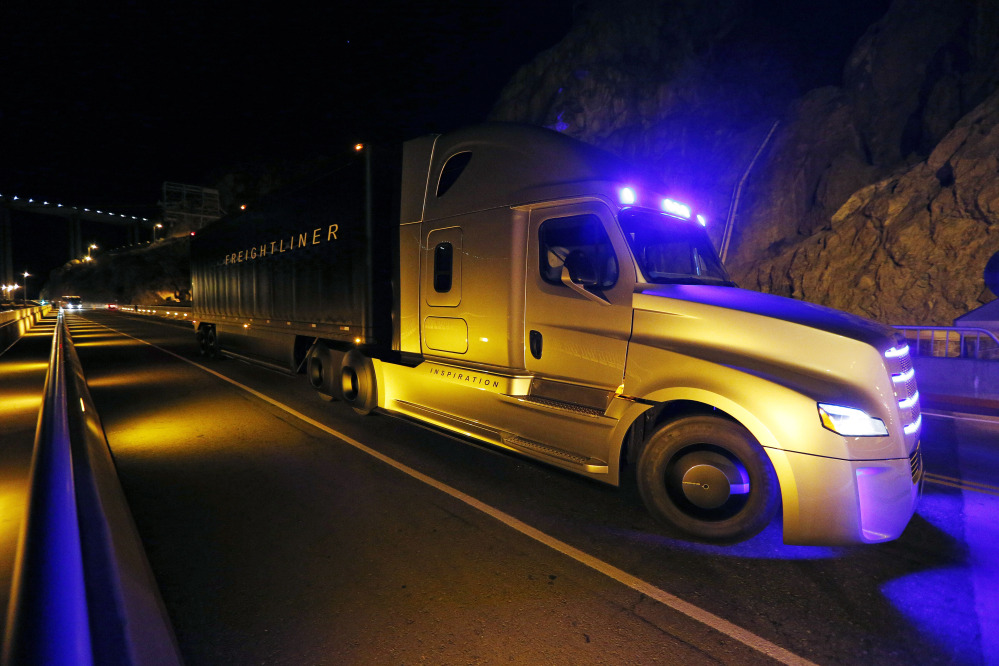LAS VEGAS – Its name is “Inspiration” and Daimler Trucks says it’s the first ever self-driving semi-truck licensed to drive on public roads – in this case Nevada’s highways – not only for testing, but business, too.
Daimler Trucks North America LLC debuted the self-driving big rig Tuesday night with a drive – and a driver steering – atop the Hoover Dam on the Nevada-Arizona border.
Taking a line from astronaut Neil Armstrong, Dr. Wolfgang Bernhard of Daimler Trucks and Buses told the crowd bused to the site from Las Vegas for the news conference that they were about to witness “a short drive for man and a long haul for mankind.”
On Wednesday, the company planned test-drives with invited members of the media to show off the automated technology.
“We are really showing that we’re at the cradle of innovation,” Nevada Gov. Brian Sandoval said Tuesday after helping affix the state’s automated vehicle license to the truck.
The truck isn’t quite a working reality, though. For one, Daimler isn’t taking customer orders just yet.
“We’re far from that. We’re just getting people inspired,” said Dr. Wolfgang Bernhard, member of the board of management of Daimler AG.
The company, if it was in the physical logistics business, could ship goods between Reno and Las Vegas on the state’s highways if it wanted to thanks to its state license, a first of its kind for an autonomous semi-truck. But it won’t be doing that. Instead, it will be conducting more tests and showing off what the truck can do.
“You have to give people something to play with,” said Daimler Trucks North America president and CEO Martin Daum. Only then can the company make a product to sell.
As he walked the length of the Hoover Dam back the way his company’s truck came Tuesday, Daum said it was a first step, much like landing on the moon. It may be many more years before man lives on the moon, he said, but between those first steps and today, there have been advancements.
Legal and philosophical questions remain, as does perfecting the technology.
Daum said society might forgive a number of deaths caused by tired truck drivers at the wheel but they would never forgive a single fatal crash blamed on a fully automated big rig.
That’s also why the company has no intention of ditching drivers. Instead, in this new autonomous world, the driver would be more of an on-board logistics manager.
Technology companies and consumer car makers – Daimler’s Mercedes-Benz included – have been toying for years with making and selling autonomous cars with some technology already appearing in some cars today, including blind spot warnings, automatic parallel parking and braking assist.
Still, “we believe that before passenger cars will be cruising around in suburbs, long before that, you will be seeing heavy trucks running on the interstate highways,” Bernhard said. There are no intersections, no red lights, no pedestrians, he said, making it a far less complex trip for a truck to make.
Bernhard said more states need to allow testing of autonomous driving before fleets of self-driving semi-trucks fill U.S. freeways and interstates anytime soon.
“Then it starts to make sense for our customers,” Bernhard said, when states that allow it are linked together. “That will be the point when the tipping point is reached.”
For now four states, including Nevada, and the District of Columbia certify testing of autonomous vehicles on public roads as long as a human driver is behind the wheel, and a few others are keen on allowing the tests.
“We need more than that, and it will take some time,” he said.
Send questions/comments to the editors.



Comments are no longer available on this story